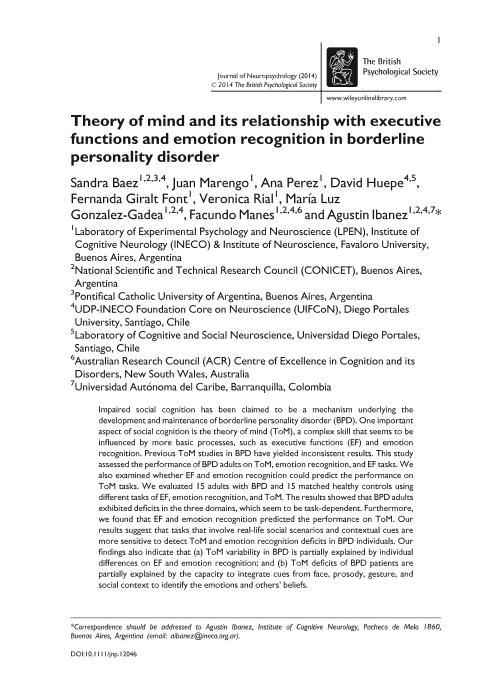Artículo
Theory of mind and its relationship with executive functions and emotion recognition in borderline personality disorder
Báez Buitrago, Sandra Jimena ; Marengo, Juan; Perez, Ana; Huepe, David; Font, Fernanda Giralt; Rial, Veronica; González Gadea, María Luz
; Marengo, Juan; Perez, Ana; Huepe, David; Font, Fernanda Giralt; Rial, Veronica; González Gadea, María Luz ; Manes, Facundo Francisco
; Manes, Facundo Francisco ; Ibañez, Agustin Mariano
; Ibañez, Agustin Mariano
 ; Marengo, Juan; Perez, Ana; Huepe, David; Font, Fernanda Giralt; Rial, Veronica; González Gadea, María Luz
; Marengo, Juan; Perez, Ana; Huepe, David; Font, Fernanda Giralt; Rial, Veronica; González Gadea, María Luz ; Manes, Facundo Francisco
; Manes, Facundo Francisco ; Ibañez, Agustin Mariano
; Ibañez, Agustin Mariano
Fecha de publicación:
09/2015
Editorial:
British Psychological Soc
Revista:
Journal Of Neuropsychology
ISSN:
1748-6645
Idioma:
Inglés
Tipo de recurso:
Artículo publicado
Clasificación temática:
Resumen
Impaired social cognition has been claimed to be a mechanism underlying the development and maintenance of borderline personality disorder (BPD). One important aspect of social cognition is the theory of mind (ToM), a complex skill that seems to be influenced by more basic processes, such as executive functions (EF) and emotion recognition. Previous ToM studies in BPD have yielded inconsistent results. This study assessed the performance of BPD adults on ToM, emotion recognition, and EF tasks. We also examined whether EF and emotion recognition could predict the performance on ToM tasks. We evaluated 15 adults with BPD and 15 matched healthy controls using different tasks of EF, emotion recognition, and ToM. The results showed that BPD adults exhibited deficits in the three domains, which seem to be task-dependent. Furthermore, we found that EF and emotion recognition predicted the performance on ToM. Our results suggest that tasks that involve real-life social scenarios and contextual cues are more sensitive to detect ToM and emotion recognition deficits in BPD individuals. Our findings also indicate that (a) ToM variability in BPD is partially explained by individual differences on EF and emotion recognition; and (b) ToM deficits of BPD patients are partially explained by the capacity to integrate cues from face, prosody, gesture, and social context to identify the emotions and others' beliefs.
Archivos asociados
Licencia
Identificadores
Colecciones
Articulos(SEDE CENTRAL)
Articulos de SEDE CENTRAL
Articulos de SEDE CENTRAL
Citación
Báez Buitrago, Sandra Jimena; Marengo, Juan; Perez, Ana; Huepe, David; Font, Fernanda Giralt; et al.; Theory of mind and its relationship with executive functions and emotion recognition in borderline personality disorder; British Psychological Soc; Journal Of Neuropsychology; 9; 2; 9-2015; 203-218
Compartir
Altmétricas



